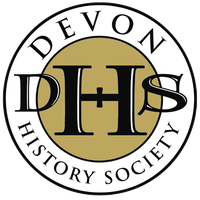Fewins, Mrs Edith, 7 Connaught Avenue, Mutley, Plymouth
Edith Jane Fewins[1] (1873 – 1947) was born Edith Watkins, the daughter of John and Eliza Watkins. John was a cabinet maker, and the family (William, Eliza, Edward, Edith and Ernest) grew up in the terraced streets on the slopes of North Hill. They lived at 19 Wellington Street in 1881 and 18 Nelson Street in 1891.
Edith, like her elder sister Eliza, became a teacher. She is recorded as a pupil teacher in 1891 and as the infants’ school mistress at the Laira Board Schools in 1893, where her work in training the infants in their bar-bell exercises was particularly praised at the school entertainment and concert.[2] In later life, when she ran her own school, she was always interested in coaching the children to dance and perform sketches.[3]
In 1903 Edith married George Fewins, a printer’s compositor lodging in Neath Road not far from Desborough Road where Edith and her widowed mother were living in 1901. The Fewins had two daughters, Phyllis Mary and Marjorie Edith, born in 1904 and 1905. The family moved to a larger house, 7 Connaught Avenue, just off Mutley Plain. The house had 8 rooms, and in 1911 also accommodated Edith’s mother and nephew, and two live-in servants. Edith was a member of the Mutley and Peverell Women’s Co-operative Guild, and chair in 1912, and it was perhaps the political education she received there that drew her to support the movement for women’s suffrage.[4] She also acted as Secretary to the Conference on School Clinics, convened in 1912 by ‘religious, educational and political organizations, teachers, co-operators, Friendly Societies trade unionists and others.’[5]
In 1908, when the Women’s Social and Political Union (WSPU) decided to send down an organiser to help set up a branch in Plymouth, Edith became involved. She gave a lecture on Women’s Suffrage to the Devonport YMCA Debating Society in November 1908, setting out an outline of the history of the movement.[6] The next year she took two weeks away from Plymouth to join the WSPU caravan in the Midlands, stopping on a daily basis to convene and address a public meeting to encourage recruits and sympathisers. Votes for Women refers to stopping places during the fortnight at Bedworth, Longford, Warwick, Leamington and Kenilworth, and notes Mrs Fewins as speaker at the Warwick meeting.[7] In addition to her tour in 1909 Fewins described her experience ‘last summer’ in a lecture to the Free Church League for Woman Suffrage in 1912, so the caravan tour may have been a regular commitment.[8]
By 1912, however, it seems that Fewins had switched her allegiance from the WSPU to the National Union of Women’s Suffrage Societies (NUWSS) as she is not only referred to as acting in their fund-raising entertainments,[9] but chaired a ward meeting in Laira in connection with the local elections that year.[10] George evidently sympathised with her views. Although it seems possible that he recorded her on the 1911 census against her will (she appears at the bottom of the list of those in the household, almost as an afterthought and may not have been present at all) they both entered a Western Daily Mercury competition for comments on the Reform Bill in 1912, sending in quotes from Tennyson’s poems (Edith from ‘Despair’ and George from ‘Locksley Hall’) lamenting the fact that women were left out of the draft legislation.[11]
After 1912 no further records of Fewins’s pro-suffrage activity have been identified. George Fewins died in 1915 at the early age of 46. In 1914 Kelly’s Directory records Mrs E Fewins as the occupier of 7 Connaught Avenue[12], raising the possibility that perhaps George Fewins was already away in hospital. The Directory also records that Mrs E Fewins was running a preparatory school at the Connaught Avenue address, later known as Connaught House School.[13]
Suffrage activity would no longer have been a priority in these years. After the vote was gained, however, Fewins did appear at the Peverell Women’s Co-operative Guild Social in March. She spoke in favour of the motion that the Plymouth Co-operative Society should form a woman’s party, arguing that a new party would attract new members and help until ‘they caught up with men in politics’.[14] The motion was lost.
No further information has been identified about Edith in later life.
Entry created by Anne Corry and Julia Neville, January 2019
[1] Family and census information from www.ancestry.co.uk
[2] Western Morning News (WMN), 4 Feb 1883.
[3] WMN, 23 Mar 1916, 14 Mar 1918.
[4] Western Daily Mercury (WDM), 18 Jan 1912. She chaired a meeting of the Guild at which Dr Rosa Bale (q.v.), a fellow suffrage activist, spoke on The Care of the Feeble-Minded.
[5] WDM, 29 Jan 1912.
[6] WMN, 5 Nov 1908.
[7] Votes for Women, 20 Aug 1909, 1092; 27 Aug 1909, 1114.
[8] WDM, 8 Feb 1912.
[9] WDM, 27 Apr 1912
[10] Common Cause, 29 Nov 1912.
[11] WDM 22 Jun 1912. Edith’s quote ran:’ We hoped for a dawn and it came/But the promise had faded away/we had passed from a cheerless night/to the glare of a drearier day’. George used: ‘Chaos, cosmos! Cosmos, chaos!/ Once again the sickening game/ Freedom, free to stay herself/ And dying while they shout her name!’
[12] Kelly’s Directory of Devonshire, 1914, Vol. 1, London, Kelly & Co, 535
[13] WMN 14 Mar 1918.
[14] WMN 14 Mar 1918.
